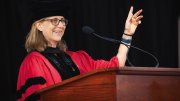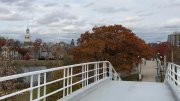A place 388 years young naturally has lots of traditions. Yet it keeps adding new ones. Among the latter is the first-year convocation, held for the sixteenth time this September 2. Among the former is Morning Prayers, dating from the founding in 1636 and launching this fall term on September 3. Their intersection at the beginning of each academic year has taken on added significance as a way to set a tone—especially after the 2023-2024 turmoil, when the place needed a reset.
In their convocation remarks, President Alan M. Garber and College Dean Rakesh Khurana implored the class of 2028 to open their ears as well as their mouths, and to make the most of their peers. Ditto Garber’s remarks at Appleton Chapel the next morning (see “Smooth Start,” this issue).
It’s uncertain how much the audience absorbs of such exhortations (the Kuumba Singers elicited the loudest cheers during convocation). But one piece of the opening days’ rhetoric may come to linger in their memory. Rather than delivering a Big Message at convocation, Amanda Claybaugh, dean of undergraduate education and an English professor, talked about academics and coursework. She chose to teach a lesson that engaged the young scholars while melding Harvard’s traditions with its current capacities.
Having asked how many of the newbies knew their history (Harry Elkins Widener and the Titanic, etc.), she pivoted to the plaque outside Johnston Gate:
“That plaque tells the story of Harvard’s founding in 1636…: After God had carried us safe to New England and we had builded our houses, provided necessaries for our livelihood, reared convenient places for God’s worship, and settled the civil government, one of the next things we…looked after was to advance learning and perpetuate it to posterity.…The people who founded Harvard College were Puritans…with convictions about church ritual that they would not compromise.” After six arduous years, she continued, they “felt that their present was secure enough that they could start to prepare for the future. They wanted to ensure that there would be a new generation of leaders….”
Hence the College. Fast forwarding, Claybaugh glossed the leaps from the Puritans’ theocratic curriculum to Charles William Eliot’s electives (1885) and A. Lawrence Lowell’s concentrations (1914) all the way to today, when “We are…no longer bounded by fear of God in our inquiries; on the contrary, we are protected by academic freedom from any form of external pressure, so that we can explore ideas to which others might object.”
The best way to do so, she explicated—through experiments, data analyses, or other methodologies—is by developing “the intellectual virtues, those capacities that enable the pursuit of truth. Things like curiosity; intellectual independence; intellectual humility; carefulness; thoroughness; open-mindedness; intellectual courage. These capacities will make you better thinkers in the classroom, and they will also…make you better leaders outside it.”
This fresh formulation centers academic work in the classroom alongside “moral virtues like fairness or compassion or kindness—or piety, patriotism, and valor,” all of which Claybaugh happily situated in the students’ extracurriculars and daily discourse with peers. Nor is her formulation merely academic. As she explained:
“Think of the issue you feel most passionately about…climate change or abortion, economic development or guns, immigration or criminal justice, Ukraine or Gaza. Hold that issue in your mind and feel the force of your passion and your conviction. Now try to exercise the intellectual virtues at the same time.…[I]t can be hard…to review all the evidence, to consider all the arguments, to analyze them all with equal rigor. It’s easy to dismiss our opponents as evil or stupid…; it can be hard to…see the world through their eyes.…It’s easy to be certain; it can be hard to maintain intellectual humility. But intellectual humility is something that even our Puritan predecessors tried to maintain…when they implicitly admitted that there were things they didn’t know or had gotten wrong. And surely, we do not want to be more close-minded than they.”
No, we don’t. From the seed planted in 1636, something tremendous has grown. Properly tended, it can keep growing. By connecting that venerable history to contemporary stakes, Claybaugh renewed Harvard’s essential tradition when it matters most—because the University, she said (invoking Dexter Gate’s “Depart to serve better thy country and thy kind”), is “a courtyard with gates all around,” connected to a world desperately in need of leaders for what she (hopefully) deemed “pluralistic democracies.”








